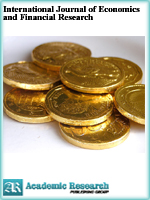International Journal of Economics and Financial Research
Online ISSN: 2411-9407
Print ISSN: 2413-8533
Print ISSN: 2413-8533
Quarterly Published (4 Issues Per Year)

Archives
Volume 3 Number 9 September 2017
International Capital Flows and Inclusive Growth in Nigeria
Authors: Ewubare, Dennis Brown ; Ozigbu, chukwuma Johnbosco
Pages: 182-196
Abstract
The study is on the effect of Net capital inflow on inclusive growth in Nigeria. This study seeks to deepen the understanding on how capital inflow creates opportunity for inclusive growth in Nigeria through increase in GDP per capita. The objective of the study were to : determine the effect of Net capital inflow , Net foreign direct investment and trade openness on inclusive growth in Nigeria. The study employed the time series data in its analysis. The period of analysis spanned through 1980-2015 and the dataset required for the analysis were sourced from the Central Bank of Nigeria (CBN) Statistical Bulletin and National bureau of statistics publications. The study conducted trend analysis, descriptive analysis. The data were also tested for stationarity using the Augmented Dickey Fuller (ADF) unit root test and Ordinary Least Square (OLS) analytical techniques, cointegration test and error correction mechanism. It was evident from the unit root test that the variables were fractionally integrated while the cointegration test reveals that long run relationship exists among the variables. The findings equally reveal that capital inflow exerts significant negative influence on GDP per capita. This could be attributed to the problem of managing external capital flows which has been sub-optimal in most developing economies including Nigeria. The implication of this finding is that the perceived benefits that are associated with capital inflows tend not to hold sway in Nigeria over the sampled period which may be attributed to institutional and governance failure. Owing to the findings, this study recommends for the adoption of investment friendly policies and ensure transparency and good governance, appropriate economic management practices capable of supporting reforms in the Nigerian financial system and guide international capital inflows to ensure that the associated economic turnarounds are people-centered.
An Empirical Study: Financial-Market Imperfections and Investment
Authors: ByungWoo Kim
Pages: 173-181
Abstract
Korean economy undergoes pre-modernized corporate governance. Financial-market imperfections assumed to be incorporated in equity ratio affect the sensitivity of internal funds to physical investment. Empirical analyses show that the effects of asymmetric information are significant. Theories predict that internal finance is less costly than borrowing or issuing equity. Higher cash flow from higher profits affects investment ratio. But, this marginal effect is decreased by equity ratio. If we assume that more imperfect financial market requires more equity than borrowing, we can see that agency costs change the way economic variables like cash flow affect physical investment. Cash flow plays two opposite roles for implementing investment. In the case of financial-imperfections, we can expect that firms with higher profits invest more. But, according to free cash flow hypothesis by Jensen (1986), managers with only a small ownership interest have an incentive for wasteful management. We can expect to see more wasteful activity in a firm with large cash flows. Our regression result shows that the former dominates the latter, so we get positive coefficient for cash flow variable on the physical investment.
Impact of Index Options on Emerging Market Volatility: The Case of the Malaysian Equity Market
Authors: Md. Mohibul Islam ; Anisul M. Islam
Pages: 157--172
Abstract
This study investigates the impact of the introduction of index options on emerging market volatility in the context of Malaysia. Company specific daily closing prices for 29 listed companies were examined to determine the conditional volatility shifts before and after the introduction of index options. Multiple window periods are examined to avoid year-end effects.The exponential generalized autoregressive conditional heteroskedasticity (EGARCH) (1.1) model is used to determine the conditional volatility shift before and after the introduction of index options in Malaysia. The findings of this study suggest that the introduction of index options reduced market volatility in the Malaysia equity market at the 0.01 level of statistical significance. Further, this study contributed to extant literature because it uses company-specific daily equity price data and no such previous study exists on the impact of index options for this important emerging market. The study will be useful for academics, researchers, domestic and foreign investors and policy-makers, among others.



